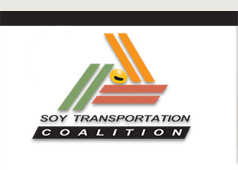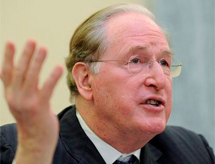 |
 |
|
| eNews • October 2010 | ||
| Promoting a Cost-Effective, Reliable and Competitive Transportation System |
||
 Rockefeller reiterates commitment to rail reform.
Rockefeller reiterates commitment to rail reform.
Senator Jay Rockefeller (D-WV), Chairman of the Senate Commerce, Science, and Transportation Committee, reiterated his commitment for reform of the rail industry in a September 15 hearing titled, “The Federal Role in National Rail Policy.” John Porcari, Deputy Secretary of the U.S. Department of Transportation, and Daniel Elliott, Chairman of the Surface Transportation Board (STB), were witnesses during the hearing.
“I want everybody in this room to know that whether we do it this year or next year, railroad reform is going to happen,” Rockefeller said. “Either Congress will do it, or it will need to be done through regulation.”
In December of 2009, the Senate Commerce Committee passed S.2889, “The Surface Transportation Board Reauthorization Act of 2009.” However, that bill has not been brought to the full Senate for a vote. A summary of the legislation can be accessed on the Soy Transportation Coalition website at: http://soytransportation.org/newsroom/STBReauthorizationSummary.pdf.
Hours before the start of the hearing, Rockefeller issued a committee staff report that highlighted the financial health and profitability of the rail industry.
“What this important report tells us is that the railroads are earning 12 percent and 13 percent profit margins, which puts them at the top of the Fortune 500,” Rockefeller claimed. “And they’re just getting more profitable because they’re raising their shipping prices by an average of 5 percent a year. But the railroads say different things depending on their audience.
When they’re talking to the Surface Transportation Board, they act like it’s still 1980. They say they’re barely making enough money to keep the lights on. But when they’re on their quarterly calls with Wall Street investors, it’s a very different story. These companies tout their high profit margins and their power to dictate prices to their customers. And at the same time they’re telling Congress that they don’t have enough money to invest in needed capital projects, they’re using billions of dollars of their profits to reward their shareholders with dividends and stock buybacks. This is all happening at a time when shippers all over our country are paying more than their fair share to transport their goods to their customers – paying more because they have no other alternative.”
In response to the committee report, Ed Hamberger, President and CEO of the Association of American Railroads, issued the following statement:
“We vehemently disagree that there is a need to roll back the successes achieved since the 1980 Staggers Act. The vision held by Congressional Democrats and President Carter 30 years ago – allowing railroads to succeed or fail in the marketplace – has resulted in railroads becoming a true American success story. Imposing new Washington regulations will undermine railroads’ ability to sustain the private investments in the nation’s rail network that provides hundreds of thousands of American jobs, and the foundation for both freight and passenger rail.
The report makes profits and corporate efficiency sound like dirty words. The reality is the railroad industry’s return to financial health has resulted in private capital – not taxpayer dollars – getting turned back into building and maintaining the nation’s rail network. Even during the worst recession in 80 years, America’s freight railroads have kept investing, spending $21.8 billion of their own private capital in 2008 and $20.2 billion in 2009 to build, maintain and modernize the nation’s 140,000-mile rail network that serves both passengers and freight.”
There’s nothing wrong with success. We’ve run smart, successful businesses, improving efficiency and service for our customers, while keeping prices below what they were 30 years ago. Now is not the time to inject greater regulatory involvement from Washington, but instead to keep letting the current balanced system work.”
During the hearing, STB Chairman Daniel Elliott conceded the need to review the relationship between railroads and rail customers to determine if greater balance can be achieved.
“I believe that the arena has significantly changed since the Staggers Act’ and that a wide-ranging review is needed to determine whether shippers lack access to competing railroads,” Elliott stated. He committed to reviewing the rules put in place in the 1980s designed to restore railroads to financial stability that may have resulted in reducing competition in certain areas of the country. Elliott also said he would explore eliminating regulatory exemptions for railroads, and lowering the filing fee for challenging rates before the board – making the process more accessible.
Soy Transportation Coalition |
|
